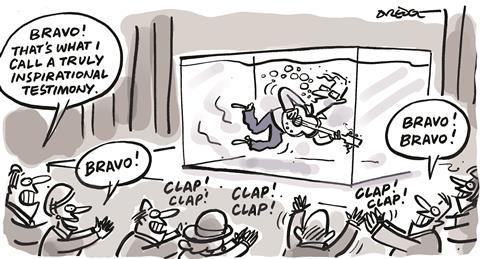
Singing has never really been my gift. As a new believer, the church I joined practised full immersion baptism which, when first observed, seemed like an aquatic mugging. The time came for me to publicly affirm my faith in Jesus by taking a dip.
Expected to share a pre-dunking ‘word of testimony’, I decided to write a song about my journey into faith. The result was surely an appalling experience for the dutifully grinning congregation. A friend accompanied me, singing in an entirely different key from the one I’d chosen. My lovely church family clapped and cheered when I went under the water, possibly because they knew that I wouldn’t be able to warble another excruciating verse while submerged.
Undeterred, I decided to become a worship leader. Armed and dangerous with a guitar, I even spent some time in a Christian rock band until, finally, a trusted friend suggested I hang up my guitar, adding that the Church would likely offer a collective sigh of relief if I heeded his advice. And so I did. But my tuneless ventures came back to mind this last week.
Attending a small church with a congregation of around 40, I noted that they were singing to backing tracks. Then I spotted Amy (not her real name) sitting in her wheelchair in the front row. Amy’s love for Jesus was obvious, as was her tunelessness. As we sang, her voice soared above the rest of us, stunningly off key, utterly liberated from the shackles of musical notation. To add to the agony, she’d decided not to sing all the words, but rather save her breath, enabling her to bellow out every third or fourth line at a volume possibly heard on Pluto.
It was then that it happened. The minister turned towards Amy, and I feared a gentle rebuke, a gesture of hush. But instead, he gave her an encouraging smile, one that told her to go for it, to sing her heart out.
That momentary gesture brought back the truth of what the Church is called to be. We are a band of the broken, our lives often tuneless. We so want to be beautifully symphonic but, to paraphrase Paul’s famous words to the Corinthians, often our lack of love makes us sound like clanging cymbals. We are at best, to borrow Henri Nouwen’s phrase, a band of wounded healers.
Yet in God’s family of raggamuffins, we find welcome – or at least, we should. But the good news doesn’t stop there. Because we are in the presence of the ultimate maestro.
The author Lloyd C Douglas tells of a retired music teacher with whom he once shared lodgings. The older man was housebound and, every morning, they’d share a ritual of sorts. Douglas would open the old man’s door and ask the same question: “Well, what’s the good news?” The music teacher would pick up his tuning fork, tap it on the metal arm of his chair, and say: “That’s middle C! It was middle C yesterday; it will be middle C tomorrow and it will be middle C in 1,000 years from now.”
We may be musically shambolic, but we walk with Jesus who is perfection personified, the middle C, and who works daily to create melody in and through us.
It is a work that takes a lifetime. And so patience is needed, with others and with ourselves. I can still remember the shining eyes of those who were kind enough to celebrate my cacophonic baptism. It’s the same sparkle I saw in Amy’s eyes, and it comes from the knowledge that we are at home. Grace is ours. Let’s pass it around.






































No comments yet